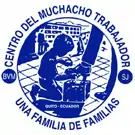Working Boy Center
Working Boy Center (Centro del Muchacho Trabajador – CMT) is a development centre in Quito, founded by the Society of Jesus in 1964. It carries out development programs for working boys and for their families.[2] Its stated aim is to give working children help to work out of their situation of extreme poverty and to gain control of their own lives,[3] and to do this by providing education for them and for their families, together with meals, health services, housing assistance, loans to start up microbusinesses, and cultural enhancement.[4][5]
 | |
| Abbreviation | CMT |
|---|---|
| Established | 1964 |
| Location | |
Founder | John Halligan[1] |
President | John James Halligan |
Director | Gilberto Freire |
| Affiliations | Jesuit, Catholic |
| Website | CMT |
History
In 1964 the Worker Boys' Center began with 200 shoeshine and street worker boys in the attic of La Iglesia Church in the old centre of Quito.[6] Early primary education was given, along with three daily meals and healthcare. Boys were trained in carpentry and shoemaking. In 1974, a headquarters was set up at La Marin. Working children's families were included in a comprehensive training program, adding adult education and various technical skills. In 1981 the opening of Worker Boy #2 in northwest Quito (Cotocollao) resulted in the extension of services to 400 families.
In 1984 the Craft Defense Board and the Ministry of Education gave official recognition to the technical education workshops. A clinic was later added to health services and health promoters were trained. Marketing was taught in a business school joined to the workshops. A training program for microentrepreneurs was launched and loans made available. In 2002, the "Drop of Milk" program in product donation led to the CMT Milk Drop Society. The Office of Development subsequently changed the focus of the CMT to systematize its activities and to add a human development proposal.[7] In 2015 the President of Ecuador Rafael Correa speaking at the Center acknowledged its help in reducing child labor over the past eight years from over 16% to under 3%.[8]
Education
Primary education for working children and a program for children with disabilities are offered.[9] Technical education, extending to adults, involves training and internships in workshops while students study the specialties of automotive and industrial mechanic, carpentry and furniture, plumbing, beauty salon, sewing,[10] restaurant, and bakery. Adult Training also offers completion of a primary diploma. Technical High School with IRFEYAL is also available for those who wish to continue their studies.[11] The center has offered a degree in Automotive Mechanics[12] and was declared by the Ministries of Education and Labor the "best technical school in the nation" in 1997 and 2002.[13]
References
- ECUAVISA TV on Halligan and origins. Accessed 12 December 2016.
- "OTRAƎDUCACION: Niños que trabajan y estudian (CMT, Ecuador)". OTRAƎDUCACION. Retrieved 2017-03-31.
- "CONDICIONES DE VIDA DE LOS NIÑOS DEL CENTRO DEL MUCHACHO TRABAJADOR E INFLUENCIA SOBRE SU DESARROLLO PERSONAL Y SOCIAL". prezi.com. Retrieved 2017-03-31.
- Tiempo, El (2016-02-25). "Agasajo al Centro del Muchacho Trabajador". El Tiempo (in Spanish). Retrieved 2017-03-31.
- "Casa de la Cultura". Retrieved 30 March 2017.
- "Beginnings". Retrieved 30 March 2017.
- "Historia". centromuchachotrabajador.org (in Spanish). Retrieved 2017-03-31.
- "Presidente Correa destaca reducción del trabajo infantil y ratifica compromiso para erradicarlo | ANDES". www.andes.info.ec. Retrieved 2017-03-31.
- cmtq100 (2010-07-06), centro del muchacho trabajador n. 1, graduados 2010, retrieved 2017-03-31
- "SECAP certifica a trabajadoras del área textil en Pichincha | Servicio Ecuatoriano de Capacitación Profesional". www.secap.gob.ec (in Spanish). Retrieved 2017-03-31.
- El Telegrafo on urban entrepreneurs. Accessed 12 December 2016.
- "Centro Del Muchacho Trabajador". cursos.universia.es (in Spanish). Retrieved 2017-03-31.
- "Center teaches entire families in Ecuador". National Catholic Reporter. 2009-03-27. Retrieved 2017-03-31.
External links
- UNESCO report pp. 95-102.
- Honorary doctorates for leaders
- Rene Unda, Daniel Llanos & Luis Herrera, Spaces of Socialization of Children and Adolescents in the Working Boys' Center. Quito: Universidad Politecnica Salesiana (2014). ISBN 9789978101872.